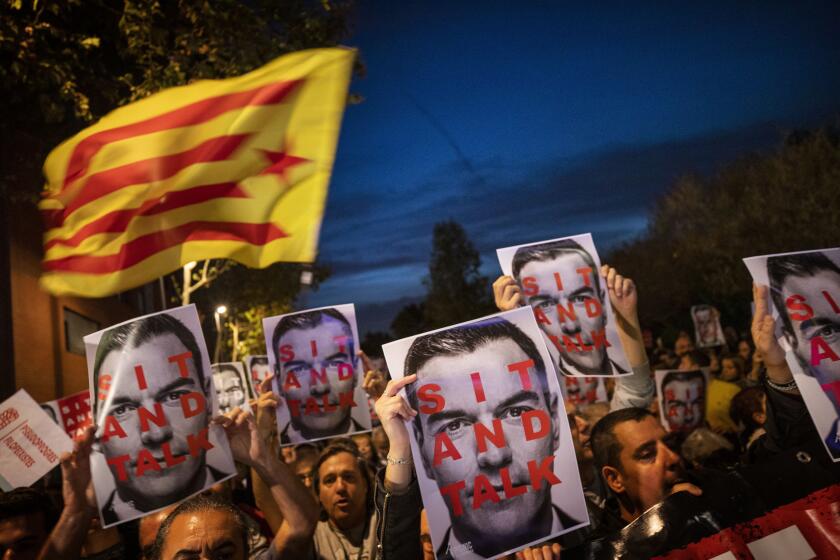Election in Spain could put the far right in power for the first time since Franco

- Share via
MADRID — Spain’s election Sunday could make the country the latest European Union member to swing to the populist right, a shift that would represent a major upheaval after five years under a left-wing government.
Prime Minister Pedro Sánchez called the early election after his Spanish Socialist Workers’ Party and its small far-left coalition partner, Unidas Podemos (“United We Can”), took a beating in local and regional elections.
The center-right Popular Party emerged from the May 28 elections with the most votes. Polls for the general election have consistently put the PP in first place — but likely in need of support from the far-right Vox party to form a government.
Such a coalition would return a far-right force to the Spanish government for the first time since the country transitioned to democracy following the 1975 death of Gen. Francisco Franco, the dictator who ruled Spain for nearly 40 years.
The Popular Party and Vox have agreed to govern together in some 140 cities and towns since May, as well as to add two more regions to the one where they already co-governed. Sen. Alberto Núñez Feijóo, the PP’s leader, has not ruled out a partnership at the national level.
Led by former PP member Santiago Abascal, 47, Vox opposes abortion rights, denies climate change and rejects the need for government to combat gender violence. Election polling indicates that the party could finish third this weekend, a showing that would put Abascal in a kingmaker’s role.
A second heat wave in two weeks has hit the Mediterranean, where firefighters are battling blazes in Greece, Spain and Switzerland.
Nagore Calvo Mendizabal, a senior lecturer in Spanish and European politics and society at King’s College London, said the likelihood of Vox entering the government frames Sunday’s parliamentary election “in terms of the future of democracy in Spain as being what is at stake.”
Vox’s manifesto is virtually a “copy-and-paste of the tenets of the Franco regime,” Calvo said. It promises, for example, a return to a highly centralized government by scrapping the 17 regions that came into being after Franco’s death.
Beyond Spain, a PP-Vox government would mean another EU member has moved firmly to the right, a trend seen recently in Sweden, Finland and Italy. Countries such as Germany and France are concerned by what such a shift would portend for EU immigration and climate policies, Calvo said.
Spain took over the EU’s rotating presidency July 1. Sánchez had hoped to use the six-month term to showcase the advances his government had made before a national election originally scheduled for December.
Italy’s European Union partners are signaling discomfort and vigilance after one of the bloc’s founding members swung far to the political right.
Voter concerns over immigration and costs of living, as well as frustration with the EU’s perceived interference in national affairs, often have been cited to explain increases in right-wing support in other countries.
In Spain, however, the dominant issue is the “honorability” of the Socialist politician who has served as prime minister since June 2018, according to María José Canel Crespo, a political communication professor at Madrid’s Complutense University.
For most of the past year, the PP has pursued a hard-hitting media and parliamentary campaign on the need to defeat what it calls “Sanchismo,” portraying the prime minister as a liar because of his U-turns on major issues.
Sánchez said he would never form a government with Podemos, deeming it too radical, but then he did in 2019. Sánchez also said he would not pardon nine separatists who were convicted of sedition after pushing for the Catalonia region’s secession — but then he did.
Spain’s coalition government has presented a proposal in Parliament to reform the centuries-old crime of sedition for one of public disorder which would carry lower sentences.
The PP accuses his minority government of betraying Spain by aligning itself with extremists in Basque and Catalan regional parties that want independence.
But the Socialist-Podemos coalition’s biggest blunder came in what was supposed to have been one of its signature pieces of progressive legislation. A sexual consent law passed in October inadvertently allowed more than 1,000 convicted sex offenders to have their sentences reduced, and more than 100 gained early release.
Sánchez apologized, and the law was amended to close the legal loophole, but the episode provided invaluable ammunition for the right-wing parties and right-leaning media outlets.
Sánchez “has made it easier for him to be perceived as a liar,” Canel said, adding that he did not help his cause when he explained in a television interview that “Sanchismo” stood for evil, lies and manipulation.
Start your day right
Sign up for Essential California for the L.A. Times biggest news, features and recommendations in your inbox six days a week.
You may occasionally receive promotional content from the Los Angeles Times.
The 51-year-old prime minister also performed disastrously in the only televised pre-election debate with the PP’s Feijóo, 61. Polling analyses show anti-Sánchez sentiment and the fear of Vox entering government has led some 700,000 Socialist voters switching to the PP, according to Canel.
“The vote is not going to be about corruption or the economy. It will be motivated by a rejection of Sánchez,” she said.
Sánchez first took office in June 2018 after winning a no-confidence vote on the back of a major corruption scandal, ending an eight-year run in government for the PP. He led a caretaker government until, after two elections in November 2019, he struck a deal with Podemos.
Within months, Spain was one of the countries hit hardest by the COVID-19 pandemic in terms of both deaths and economic impact, severely testing the strength of the left-wing coalition government. Russia’s invasion of Ukraine and its knock-on financial effects tested it again.
Spain’s bishops’ conference says it has found evidence of 728 sexual abusers within the country’s Catholic Church since 1945 through victim testimony.
Heading into the May elections, Sánchez could boast of a growing economy, falling unemployment and inflation, pension and minimum wage increases, and the establishment of a minimum basic income. The government also negotiated a deal with the EU that allowed it to slash consumer energy costs driven up by Russia’s war in Ukraine.
The various measures helped millions of people but apparently have not translated into voter loyalty. Calvo at King’s College London thinks the right-wing’s nationalist tactics have put Sánchez on the defensive, while his leftist coalition’s laudably progressive policies have made the government seem out of touch.
A factor that could upset poll predictions is Sumar, a new movement of 15 small left-wing parties, including Podemos, led by Spain’s immensely popular labor minister, Yolanda Díaz. If it beats Vox for third place Sunday, Sumar could provide the Socialists with backing to form another coalition government.
With the election taking place at the height of summer, millions of citizens are likely to be vacationing away from their regular polling places. But postal voting requests have soared, and officials have estimated a 70% election turnout.
More to Read
Sign up for Essential California
The most important California stories and recommendations in your inbox every morning.
You may occasionally receive promotional content from the Los Angeles Times.

















